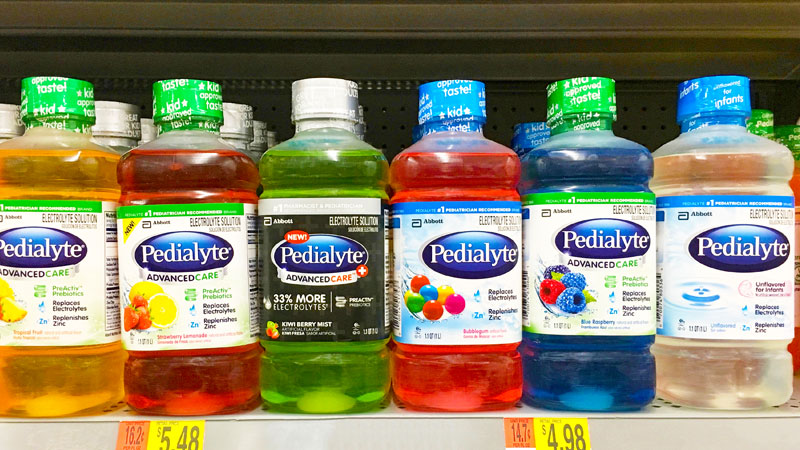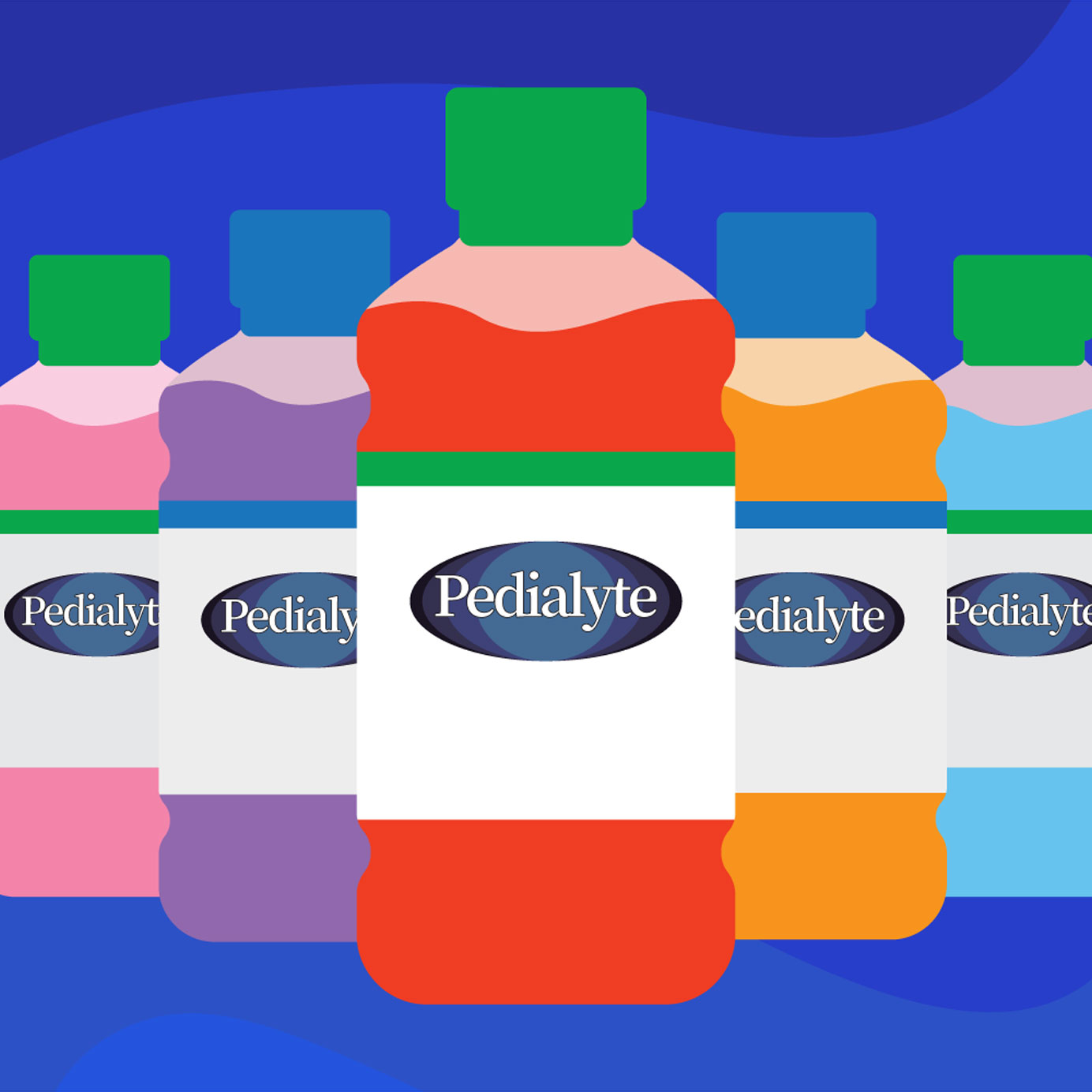Colin Joliat, the 35-year-old editor of the website Boozist.com, swears by Pedialyte. “I’ve been drinking Pedialyte since the early aughts, primarily as hangover prevention,” he says. “It has always worked wonders for me if consumed before bed after a night of heavy drinking.”
Laila Gailani, the bar manager of Zeppelin Station in Denver, Colo., agrees. “It is all I drank at Camp Runamok,” she writes in a message. Camp Runamok is an annual bartenders’ retreat in Kentucky bourbon country. “I’m pretty sure it’s the only reason I made it out alive.”
Sold in flavors like grape and bubblegum, and found in the “Baby Care” aisle of many drug stores, Pedialyte markets itself as a “medical grade hydration solution.” It originally targeted sick infants and toddlers (the familiar prefix “pedia,” as in “pediatrician,” refers to children in medical dictionaries), but it rather amazingly has become a popular source of hangover prevention and relief for adults.
What makes Pedialyte’s newfound role in drinking culture so compelling is it walks a fine line between several competing audiences and interests. The company courts its adult fans with a wink, hoping to appeal to hard-partying drinkers without alienating the concerned parents of dehydrated toddlers. Depending on whom you ask, the product is either a sugar-laden kiddie drink, a 21st-century wellness elixir, or both.

This delicate dance is proving remarkably successful. In 2015 the Wall Street Journal reported that adult consumption of Pedialyte was up 60 percent since 2012. “Adults now make up more than one-third of Pedialyte’s sales, up from a historical average of 10 to 15 percent,” Andria Cheng wrote.
It’s not unusual for adults who imbibe regularly and professionally to seek over-the-counter hangover relief. (After all, some sufferers take cold showers and eat raw eggs.) Pedialyte, however, is embracing and, moreover, seeking its inclusion in the alcohol space.
The company’s website, Pedialyte.com, has a page titled, “Dehydration Symptoms and Causes: Alcohol.” In the lead image, an unshaven man clings to his bathroom counter and pours powdered Pedialyte into a glass of water. “If you’re feeling tired, have a headache, or are experiencing other signs of dehydration after a couple drinks, See the Lyte and rehydrate with Pedialyte to feel better fast,” the copy reads.
Pedialyte push pops made a cameo at last month’s Tales of the Cocktail, a spirits industry conference attended by bartenders, distillers, marketers, and haggard journalists like myself. A colleague who attended the Atlanta Food and Wine Festival this summer spotted servers in nurses’ uniforms holding trays of Pedialyte cocktails.
https://twitter.com/pedialyte/status/991289889101680640
Eric Ryan works in brand marketing for Pedialyte and its parent company, Abbott. He is careful not to position Pedialyte as a hangover aid or endorse alcohol consumption or abuse in any way. Instead, he says, the company’s decision to market to adults was its way of speaking to an existing audience.
“Our research showed a trend of adults using Pedialyte,” Ryan wrote in an email. “These users understood that the product wasn’t just for kids.” He listed many reasons an adult might be dehydrated enough to require Pedialyte “outside of the stomach flu, including travel, exercise, heat exposure, and occasional alcohol consumption.” He notes that Pedialyte did not attend Tales in any official capacity, but that it does occasionally make appearances at wine and music festivals.
The company’s digital presence is less ambiguous. A May 1, 2018 Twitter post from the company’s verified account, @Pedialyte, encourages users to “be prepared for happy hours with our Power Packs.” An emoji and photo of an olive-studded Martini accompany the text. A 2017 post on Instagram featured a packet of Pedialyte powder alongside airplane bottles of Bacardi, branding the duo “Bachelorette party essentials.”
Another Instagram post shares images with different timestamps: a beer at 9:07 p.m.; an empty shot glass at 10:35 p.m.; French fries at 11:20 p.m.; and Pedialyte at 1:02 a.m. “A night out has many phases,” reads the caption. “Wherever you are in the process, save the best for last.”
https://www.instagram.com/p/BYN89zbHOpx/?taken-by=pedialyte
If taking a product that initially targeted sick children and marketing it to shot-taking adults makes you a little queasy, you’re not alone. One industry member said she was “appalled” by the Martini Twitter post. “The prefix literally says it’s for children,” she wrote in a message.
“On shelves, it looks like it’d be at home next to a crib; online, it looks like it’d be home at Coachella,” writes The Atlantic’s Joe Pinsker in a piece titled, “A Drink for Babies is No Hangover Cure.” Pinsker suggests that Pedialyte’s underage origins are part of its allure. Most of us feel and would prefer to be treated like tender infants when we are hung over.
Unfortunately, medical professionals agree that Pedialyte is not a magic cure. “They’d probably do as well drinking any kinds of fluids and waiting until the symptoms pass,” Dr. Stanley Goldfarb, professor of medicine at the University of Pennsylvania, told Pinsker.
Pedialyte’s adherents claim otherwise, citing its ability to protect them from or revive them after a long night of drinking. Such effects could be placebo, which, in hung over circumstances, is its own reward. And it’s inarguably beneficial to incorporate more hydration in a boozy night, whether you’re drinking from the tap or sipping a custom “cure.”
“I foresee this being a big trend in beverage, and particularly beer and alcohol industries,” Tim Faith, R&D brewer at Goose Island, says of Pedialyte’s ascension in drinking culture.
Earlier this year Goose Island tested an electrolyte-infused wheat ale. Like Ryan at Pedialyte, Faith primarily sees this as an option for those with active lifestyles. That said, it could “also perhaps help with hangovers after a night of heavy, nutrient-depleting drinking,” Faith says.

Electrolytes and nutrients are relatively new entrants to conversations about alcohol, but they are neither unfounded nor entirely unexpected in modern wellness culture. Like coconut water, and even Gatorade, Pedialyte appeals because it promises healthful-seeming entities most of us believe we absolutely want, even if we might struggle to define what exactly electrolytes are and do.
We want to believe Pedialyte can prevent our hangovers, just like we want to believe eating acai bowls and adaptogenic mushrooms will reverse the signs of aging. Wellness culture prevails because our medical institutions are distant, or untrustworthy, or constantly changing their prescriptions for health.
French drinkers reportedly believe a bowl of Gruyere-topped onion soup prevents hangovers. Russians head to the sauna. I tend to eat pasta and watch trashy action movies.
Who cares if any of it actually works? We just want to feel better already.
